Translation of idioms英语习语翻译
(translation of idiom)
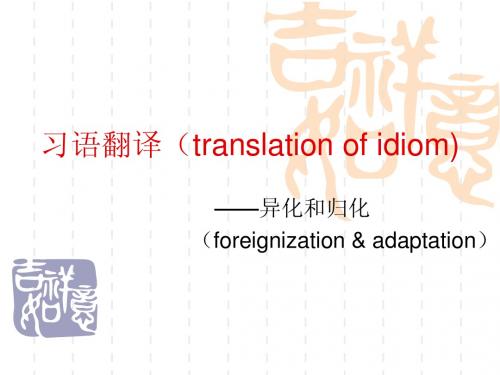
三)、习语中所含的文化词语表达的是一种原 语文化中独有的风俗、信仰、价值观和审美观。 例:Unkissed,unkind.不接吻,不友善。
(这是西方特有的 “吻面礼”,此处要是 用归化法翻译——“不作揖,不友善”,就 会失去异域文化的独特性)
直译加注
直译加注可以对文化信息作必要的补充和 解释,既可采用文中加注,也可以采用脚 注,或二者合一。 例:This was a rag to the bull [1].பைடு நூலகம்这简直就 是朝公牛摇晃红布(火上浇油)。 This was a rag to the bull [1].这简直就是朝 公牛摇晃红布。 [1].火上浇油
C.有些英语习语无固定译法,只能根据具体语境和 上下文灵活处理。 Jack owned David a dollar ,so he borrowed another from Joe to pay David back .He robbed Peter to pay Paul. 杰克欠戴维一美元,他于是向乔借了一美元去还 给戴维.这是借东家还西家. Trying to study a lesson for one class during another class is like robbing Peter to pay Paul. 要在这节课里学习那节课的内容是挖东墙补西墙。
Examples:
I don’t know what to do next. Let’s play it by ear.到时候再决定/顺其自然吧。 ear.到时候再决定/ He will laugh his head off. off. 他会笑掉大牙的。
“归化”和“异化”各有其长,亦各有其 短。两种译本对读者所起的作用不一样, 其所完成的翻译目的也不一样,所适应的 读者群也不一样。
习语、外来语的翻译
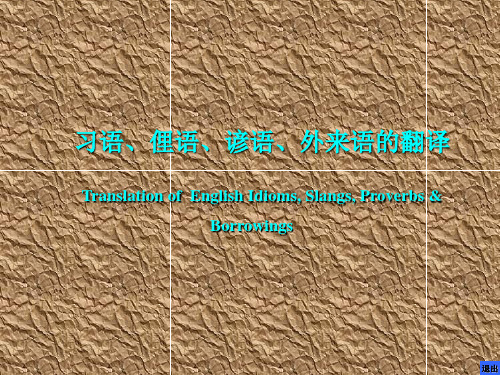
Translation of English Idioms, Slangs, Proverbs & Borrowings
退出
习语的翻译
(Translation of English Idioms)
英语习语是一个比较宽广的范畴,是经过长
时间的使用而提炼出来的固定短语或短句,是人 类从劳动中创造出来,和民族的历史背景、经济 生活、地理环境、风俗习惯、心理状态紧密相关, 把丰富的思想内涵精辟地表达出来,言简意赅、
风格和异域文化特色、文化意象,对原习语的表现 形式和意义原则上不做任何调整。鲁迅先生说过: “竭力想保存原书的口吻,大底连语句的词语也不 甚颠倒”。这也许就是直译的意思。
7 返回章重点退出
a die-hard think tank time frame the hot line paper tiger armed to the teeth comfort woman to burn one’s boats to fan the flame(s) to turn a deaf ear to to have a well-oiled tongue a gentleman’s agreement
人生如梦。
返回章重点退出
12
Give him an inch and he’ll take an ell. 得寸进尺。 Beauty is in the eye of the beholder. 情人眼里出西施。 He spent money like water. 他花钱跟流水似地。 An idle youth,a needy age. 少壮不努力,老大徒伤悲。 While there is life, there is hope. 留得青山在,不怕没柴烧。
10.习语、俚语、谚语、外来语的翻译
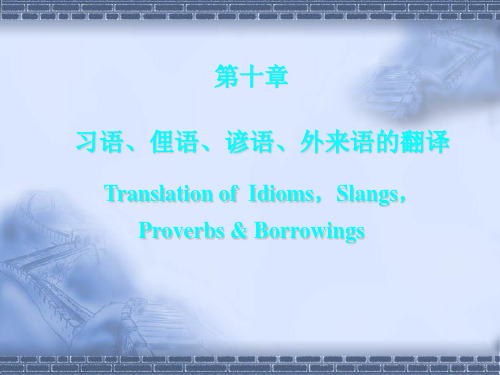
4.Bell is known by the sound.
【译】听音便知钟好坏。
5.Great honours are great burdens.
【译】誉高任重。
10 返回章重点退出
课堂互动3:翻译下列谚语(参考译文)
6.All men of action are dreamers.
A. 街上的妇女 B. 妓女 B. 温柔的妈妈 B. 男(性)情人
22. sweet mama
A. 女(性)情人 A. 好爸爸
23. sweet papa/ sweet man
24. upstairs /upper story
A. 脑子 B. 楼上的故事
B. 女电话员
9 返回章重点退出
25. call girl
【译文】我们常吵闹,但仍很相爱。
4 返回章重点退出
课堂互动2:正误判断(参考译文)
1.bull’s eye A. 靶心,十环 B. 牛眼睛 2.busboy A. 餐馆勤杂工 B. 公共汽车售票员 3.cold fish A. 冻鱼 B. 死气沉沉的人 4.criminal lawyer A. 刑事律师 B. 犯罪律师 5.dead horse A. 死马 B. 预付的工资,旧债
【译】诚意最少话最多。
10.Blessed are the pure in heart.
【译】清心者有福。
11 返回章重点退出
课堂互动3:翻译下列谚语(参考译文)
11.First class men are hard to come at.
【译】人才难得。
12.Enough is as good as a feast.
【译】深水有好鱼。
习语俚语谚语外来语的翻译
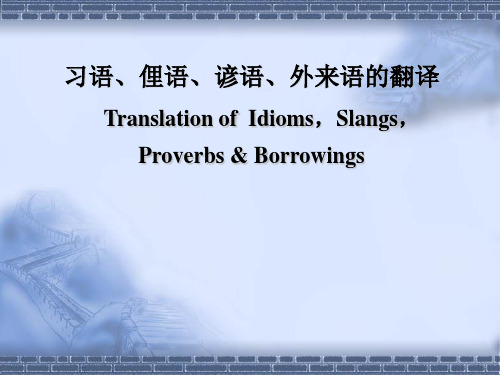
12) Two heads are better than
one. 【译文】一人不及两人智。/三个臭皮匠,胜过 一个诸葛亮。
23 返回章重点退出
习语翻译
补充练习
13) Don’t believe a word that man tells you. He’d swear black was white if he thought it was to his advantage.
特洛伊木马(内部颠覆者,起内部破坏作用的人或 事物)
14 返回章重点退出
skeleton in the cupboard(closet) 家丑 to cross the Rubicon 做出(采取)无可后悔的决定(行动);破釜沉舟 to meet one’s Waterloo 遭到惨败;败走麦城 to open Pandora’s box 打开潘多拉盒子(引起疾病、罪恶、疯狂等各种祸患) to pull the wool over one’s eyes 掩人耳目 to take French leave 不辞而别;擅自行动
小节结束
7 返回章重点退出
1. 2 套译法(Corresponding Translation)
用译文语言里的同义习语去套译
原文中的习语的一种翻译方法——套
译法。套译法实际上也属于归化译法,
但这种套译的机会不是很多。
8 返回章重点退出
to go through fire and water
赴汤蹈火
【译文】我听见我主人上楼了 —— 我的脑 门上直冒冷汗;我给吓坏了。
25 返回章重点退出
习语翻译
补充练习
15) For we brought nothing into this world, and it is certain we can carry
习语的翻译
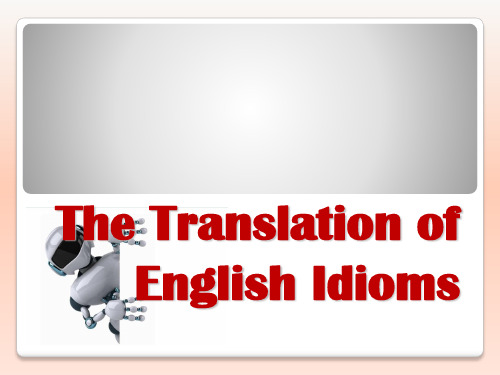
Conclus,即采用直译、释义、套译 和意译等方法使得译文不仅仅在字面上与原文对等, 在含义、褒贬作用、情感色彩等方面相当。 2.要懂得如何根据习语的特点灵活运用这些翻译技巧。 3.翻译时要越过社会文化差异的障碍,译出能使读者 产生与原文相同效果的译文。
习语在语言上具有精辟、生动、优美、形象、 通俗、寓意深刻等特点。因此,正确理解、确切 翻译英汉习语,对于我们学习和使用英语的人来 说是十分必要,也是必不可少的。
1.直译法 (Literal Translation)
直译法大致相当于异化译法 ,即不违背译文
语言规范,不引起错误联想,能保持英语习语的
Practice makes perfect. 熟能生巧。
Seeing is believing. 眼见为实。
Diamond cut diamond. 强中更有强中手。
Give him an inch and he’ll take an ell. 得寸进尺。 A lame traveler should get out bedtimes. 笨鸟先飞。 Beauty is in the eye of the beholder. 情人眼里出西施。 He spent money like water. 他花钱如流水似的。 An idle youth,a needy age. 少壮不努力,老大徒伤悲。 While there is life, there is hope. 留得青山在,不怕没柴烧。
4.意译法 (Free Translation)
意译法就是忠实于原文的内容,又不拘泥于 原文的形式而采用的按原文意思翻译的一种译法。 意译法也属于归化译法。 英语中有些习语无法直译或直译后使人无法 理解,在汉语中又找不到同义对等的习语套译, 也不能再现英语的表达形式,这时只有放弃原文 习语的形象和风格,根据上下文,灵活地传达原 作的内容。
英语习语的翻译
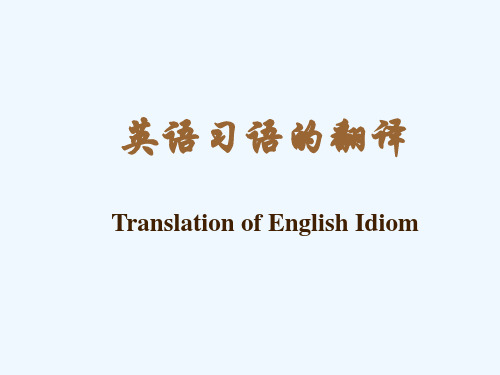
The Definition of Idioms
习语是某一语言在使用过程中形成的独特的固 定的表达方式。广义的习语(idioms)包括俗 语(colloquialisms)、 谚语(proverbs)和俚 语(slang expressions)等。
英汉两种语言历史悠久,包含着大量的习语, 它们或含蓄、幽默、或严肃、典雅,不仅言简 意赅,而且形象生动,妙趣横生,给人一种美 的享受。由于地理、历史、宗教信仰、生活习 俗等方面的差异,英汉习语承载着不同民族的 文化特色和文化信息,它们与文化传统紧密相 连,不可分割。习语中的文化因素往往是翻译 中的难点。
有其父必有其子
a lion at home, a mouse abroad
在家如狮,在外如鼠
Life is short and time is swift 人生苦短,岁月如逝
2.英语习语和汉语习语形义部分相同
as strong as a horse
力大如牛
a lion in the way
拦路虎
习语不仅大量地出现在文艺作品中和政治、 科学论文中,在口语中也会使用一些习语, 因此,习语的翻译是一个非常重要的问题, 习语翻译的好坏对整个译文的质量及听懂英 语口语都有直接的影响。
英语习语汉译主要有以下四种方法: 直译法 直译加注法 释义 归化
1.直译 (对等翻译法)
如果英语习语和汉语习语在形义方面完全相同,或
鉴于公司间的恶意接收出价最近猛增,这个国家里的那些最大的 公司有15%已为高级管理人员配备了“黄金降落伞”(*黄金降落 伞:一种工作合同,规定所在公司如被收购,雇员[常为高级行政 管理人员]可以辞职,而其薪水和各种福利照旧,直至合同期满。)
Pampering is building into what is called the "four-two-one syndrome"*-four grandparents and two parents, all doting on an only child.
英语成语翻译
The Translation of Idioms--by Wu Xiaofei, Hu Ping, Fu Mei Thank you very much. Honorable Mr. Zhang, Ladies and gentleman, Good morning!I am very happy to have this chance to give my presentation.As you see, our theme is the translation of idioms.Firstly, I would like to talk about the definition of the terms I shall use in my presentation.DefinitionIdioms are words, phrases, or expressions that cannot be taken literally.In other words, when used in everyday language, they have a meaning other than the basic one you would find in the dictionary. Every language has its own idioms. Idioms are set phrases or short sentences that are unusual either grammatically or semantically for their meanings cannot be derived from the conjoined meaning of its elements, as in “It’s raining cats and dogs!”Background informationAs we all know, idioms can somehow reflect characteristics of culture. The Chinese and English idioms are actually the typical examples. I’d like to show the differences as follows.1.Differences of comparison (比喻)中国人常常用成语“雨后春笋”来形容一般事物的迅速发展和大量涌现。
Translation of idioms英语习语翻译
• 初生牛犊不怕虎 译文:New-born calves make little of tigers. • 口蜜腹剑 译文:to be honey-mouthed and dagger-hearted • 声东击西 译文:to shout in the east and strike in the west • 望梅止渴 译文:quench one’s thirsty by thinking of plums • 画饼充饥 译文:to draw cakes to allay hunger
• Domesticating translation:
– minimizes the foreignness of the SL text by changing the heterogeneous elements into what is familiar to the TL text
• 异化:主张直译原文的语言形式(即便 这种语言形式不完全切合译语习惯), 保留构成原语言的文化因子(主要是形 象)。
• 归化:主张以纯熟地道的译语和相关联 的文化因子进行翻译。
Translation of idiom (C-E)
• Foreignizing translation • 剖腹藏珠 出自《资治通鉴· 唐纪· 太宗贞观元年》: “吾闻西域贾胡得美珠,剖身以藏之,有诸?” • rip open the stomach and hide a pearl—sacrifice life for money • 你自己手里拿着这个,岂不好?明儿再送来。——就 失了手也有限的,怎么忽然又变出这“剖腹藏珠”的 脾气来!(《红楼梦》) • 译文:Wouldn’t that be better? You can send it back later. And even if want to “cut open your stomach to hide a pearl”?
10.习语、俚语、谚语、外来语的翻译
返回章重点退出
1. 就下列范围写谚语,每组至少要写出2-3条
4) education Teaching others teaches yourself. 教学相长。 A child’s back must be bent while it is young. 修树须趁早,育人要趁小。 Better unborn than unbred. 与其不管教,不如莫生育。 Like teacher, like pupil. 严师有高徒。 Think more, and you’ll become wiser. 多思出智慧。
15.S-hook
S形钩子
16.T-shirt
T恤衫
17.An American in 《华都舞影》(影片名)
Paris
18.The Arrival
《外星人入侵》(影片名)
19.At First Sight 《真情难舍》(影片名)
20.Attack Force Z 《Z字特攻队》(影片名)
小节结束
16 返回章重点退出
A. 加油站
B. 服务站
17.shake a wicked leg
A. 跳舞
B. 扭动了一下残废的腿
18.shut-eye
A. 瞎子
B. 睡觉
19.side-wheeler/ southpaw
A. 车辆侧轮
B. 左撇子
20.soft soap
A. 拍马屁
B. 香皂
正确答案:16A 17A 18B 19B 20A
1. 就下列范围写谚语,每组至少要写出2-3条
1)life
Moderation in all things.
生活要节制。/凡是都要适可而止。
Lesson 8 习语的翻译
III. Translation of idioms
1. Corresponding idioms There are some English idioms corresponding to ready-made idioms both in meaning and in structure. Such idioms can be turned into corresponding Chinese ones and vice versa. 1) In ancient times if a man’s eye was put out by his enemy, he might get revenge by putting his enemy’s eye out. This was the rule of an eye for an eye and a tooth for a tooth.. 2) You pretended that you were helping them out of their difficulty, but actually you are pouring oil on the fire and making matters worse. 3) If it is a wet summer the firm making mackintoshes will find good markets, if there is a heat wave there will be a special big demand for bathing suits, if we have shares in both we need not feel unduly anxious about the weather, for what we lose on the swings we shall gain on the roundabouts. 4) Wall has ears. 5) a bolt from the blue
- 1、下载文档前请自行甄别文档内容的完整性,平台不提供额外的编辑、内容补充、找答案等附加服务。
- 2、"仅部分预览"的文档,不可在线预览部分如存在完整性等问题,可反馈申请退款(可完整预览的文档不适用该条件!)。
- 3、如文档侵犯您的权益,请联系客服反馈,我们会尽快为您处理(人工客服工作时间:9:00-18:30)。
Translation of idiom
• Foreignizing translation:
– retaining the cultural flavors of the SL – enables the reader to have an alien reading experience – developing the readers awareness of cultural difference
• 明枪易躲,暗箭难防 译文:It is easy to dodge a spear in ainst an arrow shot from hiding. • 城门失火,殃及池鱼 译文:A fire on city wall brings disaster to the fish in the moat. • 路遥知马力,日久见人心 译文:As a long road tests a horse’s strength, so a long task proves a person’s heart.
• “直译基础上的意译”——翻译的指导思 想 • 语言是文化的载体。翻译若仅仅传达信 息了事,那将铸就缺憾。
Domesticating translation
• 眉飞色舞: 译文:his eyebrows are flying and his countenance is dancing. 改译:to beam with joy • 粗枝大叶 译文:with big branches and large leaves 改译:to be crude and careless • 灯红酒绿 译文:with red lights and green wine 改译:dissipated and luxurious • 纸醉金迷: 译文:with drunken paper and bewitched gold 改译:(a life of )luxury and dissipation
• 所以这李纨虽青春丧偶,且处在膏梁锦 绣之中,竟如“槁木死灰”一般,一概 不问,……(《红楼梦》) • 译文:So this young widow living in the lap of luxury was no better off than withered wood or cold ashes, taking no interest in the outside world.
小结
• 归化?异化?其实质是直译与意译,是形式与 内容的矛盾。 • “Not only the equivalence content of message, but, in so far as possible, an equivalence of the form.” (Nida) • Nida提出了改变形式的五个条件。不合乎五个 条件,就不能随意更改;必须保持形式的一致, 也就是采取直译的方法。 • “Translate literally, if possible, or, appeal to free translation.” (陆殿扬)
Idiom
• An idiom is an expression not readily analyzable from its grammatical construction or from the meaning of its component parts. It is the part of the distinctive form or construction of a particular language that has a specific form or style present only in that language. (New International Webster’s Collegiate Dictionary ) • An idiom is an expression whose meaning is not predictable from the usual grammatical rules of a language or from the usual meanings of its constituent elements. (Random House Webster’s College Dictionary )
• Domesticating translation:
– minimizes the foreignness of the SL text by changing the heterogeneous elements into what is familiar to the TL text
• 异化:主张直译原文的语言形式(即便 这种语言形式不完全切合译语习惯), 保留构成原语言的文化因子(主要是形 象)。
Foreignizing translation or domesticating translation?
• 一个汉语的习语,有其含义大致相近的 英语习语,顺手牵羊,便可作归化英译; 反之,若做直译,保留其文化因素,作 异化处理,也未尝不可。何去何从,令 人犹豫。
竭泽而渔: • to drain a pond to catch all the fish(异化) • kill the goose that lays the golden eggs (归化) 打草惊蛇: • to stir up the grass and alert the snake(异化) • wake up a sleeping dog (归化) 易如反掌: • to be as easy as turning over one’s hand(异化) • as easy as falling off a log(归化)
Idiom
• Feature • Culturally relative: An idiom is generally a colloquial metaphor—a term requiring some foundational knowledge, information, or experience, to use only within a culture, where conversational parties must possess common cultural references. Therefore, idioms are not considered part of the language, but part of the culture.
Foreignizing translation ? Domesticating translation?
• 有鲜明文化色彩的习语(衍生于某个历史故事 或人物掌故) • 叶公好龙 译文:professed love of what one really fears • 南柯一梦 译文:a fond dream or illusory joy/ fond dream • 四面楚歌 译文:to be besieged on all sides • 悬梁刺股 译文:to be extremely hard-working in one’s study
• 归化:主张以纯熟地道的译语和相关联 的文化因子进行翻译。
Translation of idiom (C-E)
• Foreignizing translation • 剖腹藏珠 出自《资治通鉴· 唐纪· 太宗贞观元年》: “吾闻西域贾胡得美珠,剖身以藏之,有诸?” • rip open the stomach and hide a pearl—sacrifice life for money • 你自己手里拿着这个,岂不好?明儿再送来。——就 失了手也有限的,怎么忽然又变出这“剖腹藏珠”的 脾气来!(《红楼梦》) • 译文:Wouldn’t that be better? You can send it back later. And even if want to “cut open your stomach to hide a pearl”?
• 他一家子在这儿,他的房子、地在这儿, 他跑?跑得了和尚跑不了庙。(周立波: 《暴风骤雨》) 译文:Escape? But his home and property can’t escape. The monk may run away, but the temple can’t run with him. • 咳!这一来,竹篮子打水一场空了。 (梁斌:《红旗谱》 ) 译文:Ah! We were drawing water in a bamboo basket.
雪中送炭: • to send charcoal in snowy weather(异化) • to help a lame dog over a stile(归化) 守口如瓶: • to keep one’s mouth closed like a bottle(异化) • to keep a still tongue in one’s head(归化) 掌上明珠: • a pearl in the palm (异化) • the apple of one’s eye (归化)
Chapter Fifteen
Translation of Idioms
Idiom
• Definition • An idiom is an expression, word, or phrase that has a figurative meaning that is comprehended in regard to a common use of that expression that is separate from the literal meaning or definition of the words of which it is made.
• 刻骨铭心 译文:to be engraved on one’s heart and bones • 引狼入室 译文:to lead a wolf into the house • 重见天日 译文:to see the daylight again • 百川归海 译文:All rivers flow into the sea.
